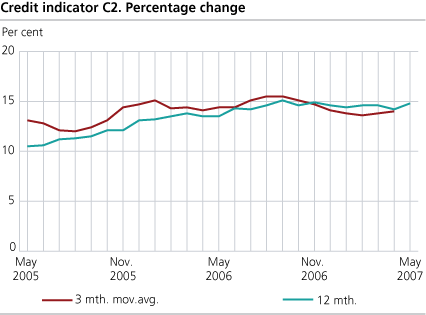Content
Published:
This is an archived release.
Increasing public gross domestic debt
The credit indicator C2 increased by 14.8 per cent in the twelve months to end-May, up from 14.2 per cent to end-April.
Municipalities, non-financial enterprises and households all contributed to the increase in the twelve-month growth in general public gross domestic debt from April to May, but non-financial enterprises had the strongest growth.
Increasing growth in non-financial enterprises
Non-financial enterprise gross domestic debt was NOK 920 billion at end-May. The twelve-month growth remains high, and was 20.9 per cent to end-May, up from 20.1 per cent to end-April. However, the growth in enterprise money supply is even higher (30.3 per cent). The strong growth in non-financial enterprise gross debt and money supply are strongly related to the high activity growth in the Norwegian economy.
Household debt growth levelling out
Household gross domestic debt was NOK 1 631 billion at end-May. The twelve-month growth was 12.1 per cent, up from 11.9 per cent in the previous month. It seems that this growth rate has remained stable around the 12 per cent mark in the last couple of months. In comparison, the highest recorded twelve-month growth rate for household gross domestic debt (according to the C2 statistics) was 13.4 per cent to end-December 2005 and the average growth during 2006 was 12.9 per cent. However, the growth in household gross debt is still higher than the growth in household money supply (8.0 per cent), see the M2 statistics .
Statistics for credit sources influenced by portfolio shifts and IFRS
About 70 per cent of the general public gross domestic gross debt of NOK 2 745 billion consists of bank loans. The twelve-month growth in bank loans was 17.1 per cent, unchanged from April. At the same time, the twelve-month growth in credit from mortgage companies increased from 12.2 to 14.3 per cent. Furthermore, the twelve-month growth in credit from finance companies increased from 9.9 per cent to 10.8 per cent. The growth rates of loans from banks, mortgage companies and finance companies are influenced by shifts in loan portfolios between these institutions. Since March 2007, the data have also been affected by the implementation of the new international financial reporting standards, IFRS, which may lead to more fluctuations in the data in the time ahead.
| Credit indicator C2. Percentage change |
| March 2007 | April 2007 | May 2007 | |||||||||||||||||||||||||||||||||||||
|---|---|---|---|---|---|---|---|---|---|---|---|---|---|---|---|---|---|---|---|---|---|---|---|---|---|---|---|---|---|---|---|---|---|---|---|---|---|---|---|
| 12 mth total | 14.6 | 14.2 | 14.8 | ||||||||||||||||||||||||||||||||||||
| 3 mth mov.avg.tot | 13.8 | 14.0 | |||||||||||||||||||||||||||||||||||||
| 12 mth households | 11.9 | 11.9 | 12.1 | ||||||||||||||||||||||||||||||||||||
|
C2 is an approximate measure of the size of the gross domestic debt of the general public (households, non-financial enterprises and municipalities) in NOK and foreign exchange. Statistics Norway also compiles the credit indicator C3, which in addition to C2 (the public’s domestic gross debt) also includes the public’s external loan debt. Most of the public’s external loan debt refers to non-financial enterprises. The C3 statistics are published approximately one month later than the C2. |
The statistics is now published as Credit indicator.
Contact
-
Statistics Norway's Information Centre
E-mail: informasjon@ssb.no
tel.: (+47) 21 09 46 42

